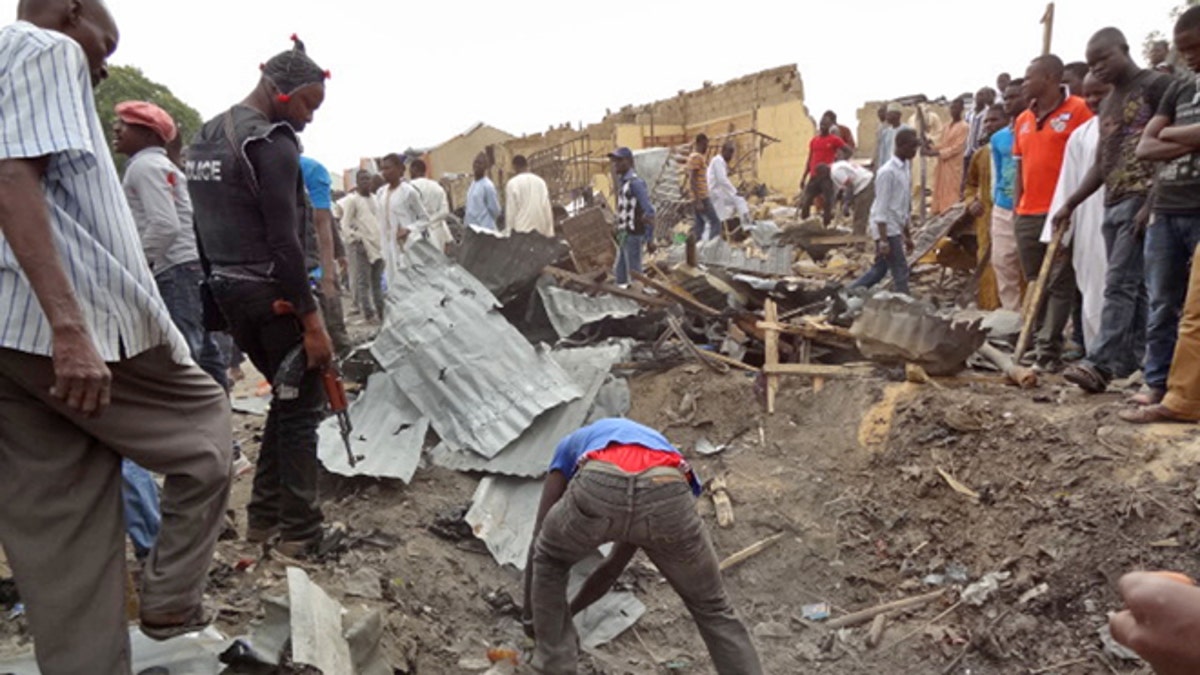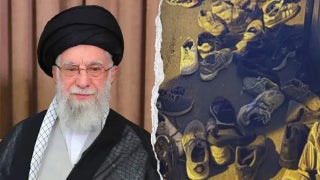
March 2, 2014: People search the area where a twin car bomb exploded in Maiduguri, Nigeria. (AP)
MAIDUGURI, Nigeria – Twin car bomb blasts at a bustling marketplace killed at least 51 people in Maiduguri, the northeast Nigerian city that is the birthplace of the country's Islamic extremist terrorist group, a Red Cross official said Sunday.
Many more people are believed buried in rubble from the Saturday night explosions that collapsed some buildings and set others aflame with smoke billowing for hours, said the official, a resident who worked at the scene through the night but insisted on anonymity because he is not authorized to speak to reporters.
The victims include children dancing at a wedding celebration and people watching a soccer match at an outdoor cinema, survivors told The Associated Press on Sunday.
Fifty corpses were retrieved, said Hassan Ali, leader of an anti-terror vigilante group.
The first blast came from a pickup truck carrying firewood and did not cause many casualties, said Ali. Most of those killed had run to the scene to help when a second explosion blasted from a passenger car, he said.
Survivors said they captured a man who jumped out of the car, grabbed a tricycle taxi and tried to make off. He was badly beaten and taken to nearby Umaru Shehu General Hospital, where a security guard said all the wounded brought in had died. Most survivors insisted on anonymity for fear of reprisals.
Some bodies were blown apart, said market trader Mallam Sumaila. An Associated Press reporter saw a corpse burned beyond recognition at a hospital where wailing families were collecting bodies for immediate burial, in the Muslim tradition.
The attackers chose a densely populated area with narrow alleyways that maximized the blasts and a Saturday night when the market was open late.
It was not known how many wounded are being treated in three hospitals in the city.
Military and police officials did not immediately offer comment and there was no claim of responsibility from Boko Haram, which communicates only through occasional videos.
The attack is a major setback to a new army and air force offensive against the Islamic uprising under new commanders since President Goodluck Jonathan fired his entire military command in January.
Since then, criticism and anger have grown as attacks have increased and become ever deadlier: More than 300 people were killed in February alone in the neighboring states of Adamawa and Yobe. Outnumbered soldiers are accused of abandoning checkpoints and leaving civilians at the mercy of extremists in two attacks last week that killed about 100 people, including one on a high school.
Maiduguri, in Borno state, had suffered only two attacks in the past six months: a Jan. 14 bomb that killed about 40 people and a bold assault Dec. 5 on the air force base and an army barracks on the outskirts in which all five aircraft on the runway were destroyed.
Such attacks have led to accusations by regional officials of collusion between some military officers and the terrorist network that wants to impose Islamic rule across Nigeria, Africa's biggest oil producer and most populous nation of some 170 million people comprising almost equal numbers of Christians and Muslims.
Opposition politicians blame a failure of leadership by Jonathan, whose perceived desire to run for re-election next February has prompted defections from the governing party amid accusations that he plans to flout a party rule alternating leadership between a Muslim northerner and someone like Jonathan, a southern Christian.
The Defense Ministry has blamed recent attacks on militants escaping aerial bombardments and ground assaults to flush them from forest hideouts and mountain caves along the Cameroon border. The military closed hundreds of kilometers (miles) of border with Cameroon last week to stop extremists escaping and using Cameroon soil to launch attacks.
Anger will be fueled by reports that a military fighter jet targeting extremist hideouts bombed a village in Yobe on Friday, killing 20.
The military knew there were alleged terrorists in Maiduguri because they reported Friday that they had killed 13 suspected extremists and arrested several, including "some picked up in Maiduguri and environs."
Maiduguri is the headquarters of the military offensive to suppress the 4-year-old Islamic uprising under a 9-month-old state of emergency.
There are fears Nigeria's conflict could spread. Boko Haram militants already operate in Cameroon, Chad and Niger and lately there have been reports the Nigerian extremists are threatening to get involved in Central African Republic, where French and African troops are trying to end fighting between Muslim and Christian militias.








































